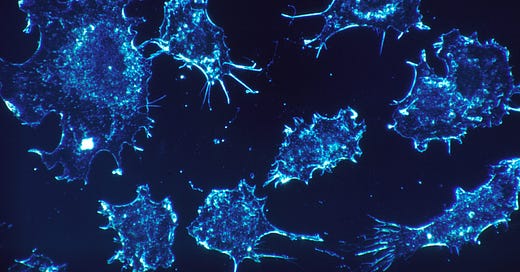Progress in Cancer Immunotherapy Research
in: Health and Well-Being
Overview of cancer challenges, treatments, immunotherapy progress, and research funding.
Cancer encompasses a group of diseases characterized by abnormal cell growth with the potential to invade tissues and spread throughout the body, a process known as metastasis. It arises from changes or mutations in cellular DNA that disrupt normal cell function, leading to uncontrolled division. In the United States, cancer remains a significant health challenge, with estimates suggesting around 2 million new cases could be diagnosed in 2024, and it stands as a leading cause of death, responsible for over 600,000 fatalities annually in recent years. Traditional treatments like surgery aim to remove tumors, while radiation therapy uses high-energy beams and chemotherapy employs powerful drugs to kill cancer cells. Hormonal therapies are used for cancers sensitive to hormones. However, these conventional methods face limitations, including the difficulty of removing all cancerous cells surgically, potential damage to healthy tissues from radiation and chemotherapy, the development of drug resistance, and significant side effects that impact patients’ quality of life.
The development of immunotherapies represents a major advancement, harnessing the patient’s own immune system to target and destroy cancer cells. Drugs like Keytruda (pembrolizumab), an immune checkpoint inhibitor that helps T cells recognize and attack cancer cells by blocking the PD-1/PD-L1 pathway, exemplify this progress. As highlighted by the Cancer Research Institute, Keytruda recently achieved its 40th FDA approval, making it available for treating 18 distinct types of cancer. This success underscores the critical role of sustained research, significantly supported by federal funding through agencies like the National Institutes of Health (NIH) and its National Cancer Institute (NCI). This funding supports foundational research and clinical trials at institutions nationwide, laying the groundwork for breakthroughs that fuel the pipeline for new therapies. While precise future projections are complex, the advancements driven by immunotherapy and ongoing research into areas like cancer vaccines and precision medicine offer a positive outlook, contributing to a 34% decline in cancer mortality between 1991 and 2022 and holding the potential to extend and save many more lives in the coming decade.
- States: CA , DA , FL , GA , MA , MD , NC , NJ , NY , PA
- Organizations: Cancer Research Institute , National Institutes of Health , National Cancer Institute , National Science Foundation , MD Anderson Cancer Center , Memorial Sloan Kettering Cancer Center , Dana-Farber Cancer Institute , Moffitt Cancer Center , University of California Los Angeles , Duke University , Emory University , Georgia Institute of Technology
- Topics: Health , Biology , Chemistry
- Federal Grants: NIH R01CA243486 , NIH U01CA250040 , NIH U01CA250040S2 , NIH RM1GM145394 , NIH F31CA243502 , NSF MCA08X014
- Links and further reading: [ link1 | link2 | link3 | link4 | link5 ]
